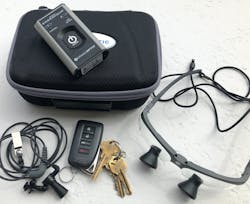Love your loupes and headlight? Surefire ways to safeguard precious gear
I met a hygienist from California at the American Academy of Periodontology meeting in 1997 who inspired me to order my first pair of loupes. Initially, my coworkers and patients laughed, but my doctors smiled. They had been using loupes for years. Within a few days, my clinical work improved, and my body was less tired and achy.
One year later, I purchased my first headlight. These purchases changed how I practiced, and they changed my perspective. From that point on, I never hesitated to invest in myself. My physical well-being became a priority, and each purchase has been worth every penny spent.
Fast forward to 2019, and using loupes and headlights is commonplace. Many people consider these two pieces of equipment the standard of care. Nearly all students purchase loupes and headlights while they’re in school, and many employers mandate magnification. Most clinicians buy a pair of loupes and a headlight at the same time, but if not, the vast majority add an auxiliary headlight within a short period of time.
It’s always so much fun to hear how happy people are when they get their first pair of loupes or first headlight. Clinicians who were not trained with this equipment are stunned by how much better they feel and how much easier their work becomes. Many wonder how they ever worked without magnification and illumination. I know how they feel.
A pair of quality loupes and a portable headlight are investments. While nothing lasts forever, there are a number of ways you can protect these important devices from unnecessary wear and tear. Let me share the lessons that I’ve learned through the years.
Respect frame integrity
The vast majority of magnification systems use a standard eyeglass or sunglass frame, items that have been adapted to support the weight of surgical telescopes. While the focus has been on creating lightweight systems, one needs to be mindful of this structural demand on a frame.
Initially, the most important thing clinicians learn is how to take their loupes on and off. Using both hands reduces strain on the frame. A one-handed approach puts tremendous stress on the hinge and temple arm interface. It causes the temple arm screw to loosen and wiggle, and eventually the screw will pop out or the hinge will break. If you’ve ever had a screw pop out, you know how impossible it is to find. Murphy’s Law dictates that a loose screw episode will occur at the exact moment that there is no time to reattach the temple arm or search for the screw.
Also, the carrier lens in a standard sports frame flexes with the one-handed approach. This puts unnecessary microstrains on the glue that holds the ocular in the carrier lens. This can result in an ocular popping out of the carrier lens, which, again, will probably be at the most inopportune time. Any of these events has the capacity to ruin your clinical day.
What’s up with battery life?
There are two types of headlights: cordless and corded. Both work with rechargeable batteries, which have a finite life span and can be recharged only so many times. A premium lithium battery typically lasts about four years. Just like the battery in a cell phone or laptop, it’s time to replace it when it fails to hold an adequate charge. The battery in most cordless units can be swapped out during the lunch hour to ensure optimal visual acuity. Batteries in corded units are larger and more robust and generally last for an entire clinical day. Equipment should be charged at the end of every clinical day.
Lights that come with a battery cable require special vigilance. It’s easy to tangle the cable with another piece of equipment. Take care to avoid snagging the cable on a door handle or other object. Battery cables that are abused eventually short out or fail without warning, so it’s smart to have a backup cable.
Preventive maintenance
There are no universal frame screws. It is important to have a few on hand just in case you need to do a quick repair between patients. Pick up a few extra at the next trade show, ask for spares when you order your next pair of loupes, or contact the company directly. Don’t expect your local optical shop to bail you out if your temple arm falls off in the middle of the day. Invest in a small screwdriver and make it a habit to check the screws in the temple arms regularly. Tighten them if necessary.
Also, inspect the nose pads. If your loupes use silicone pads or a silicone nose bridge, have a spare on hand. Over time, skin oils will cause discoloring and deterioration, and it’s not unusual for an older nose pad to suddenly disintegrate, and again, this will often happen at the worst possible moment.
Pick a day for inspection. Any date will work as long as it is a regular occurrence. It could be the first Friday of the month, the last payday of the month, or every Wednesday. Put a reminder on your calendar to alert you about these important preventive maintenance activities.
Keep loupes clean and sanitary
Some loupes are considered water-resistant, while others are classified as waterproof. Regardless of the classification, it is not a good idea to submerge your loupes into any type of fluid. It is safe to rinse most products under a stream of warm water to help remove gross debris. Most products can be cleaned safely with a soft cloth and warm water that contains a mild soap. Rinse with clear water. Use a clean, soft microfiber or optical cloth to remove moisture from the frame and oculars. Paper towels or rough fabrics can create fine microscratches on the oculars that could compromise visual acuity.
It is safe to use alcohol-based disinfectant wipes that contain no more than 20% isopropyl alcohol. Anything stronger can weaken the glue that holds the ocular in the carrier lens. There are also premoistened wipes that can be used for personal eyewear; however, these products are approved for cleaning glasses, not disinfecting equipment that’s used in a health-care environment. I do not advise that you use harsh disinfectants or chemicals. Avoid saturating the loupes with any chemical preparation.
Each manufacturer has a cleaning and disinfecting protocol. Ignoring these recommendations may cause glue or a surface coating to fail. A glue failure allows moisture to seep into the oculars. While companies are happy to support their products, don’t expect a repair or replacement if you fail to follow the company’s guidelines.
Avoiding a “what now?” experience
At the end of each day, or even between patients, get in the habit of putting your loupes in a safe place where they can’t be accidentally knocked off the counter. Store your magnification loupes and headlight in the padded box or pouch provided by the manufacturer.
Many clinicians work in more than one practice and transport their loupes from location to location. Keeping your car keys next to the storage box will ensure that your loupes and headlight make it to the next practice (figure 1). Storing loupes in the car is a risky plan for several reasons. Thieves steal first and look at the contents later, and hot cars in the summer are not a great place to keep loupes and a headlight. Intense heat can wreak havoc on product materials.
Clinicians occasionally attempt to repair their own equipment. It’s easy to install a new nose pad or a pair of temple tips or to replace a screw. There are online videos that demonstrate the step-by-step process.
Telescopes are a totally different matter. Oculars on premium loupes are installed into the carrier lens by the manufacturer based on the clinician’s specific measurements. Attempting to reglue a telescope is very risky. It is nearly impossible to re-create the exact position of the telescope and ensure accurate visual acuity. Oculars should always be reglued by the manufacturer.
Also, glue is a chemical adhesive. The chemistry of the adhesive needs to be compatible with the materials used in the ocular housing and carrier lens. The wrong glue can damage the components. The loupes will eventually have to be sent back to the manufacturer, and there will be an additional cost to replace the damaged carrier lens or ocular housing.
Before you embark upon a do-it-yourself repair, take the time to connect with the manufacturer’s tech support team. They can walk you through the steps if it’s a simple fix, and they will advise you if the product needs to be sent in for an evaluation or a factory repair.
Ensuring continuity and success
Some clinicians panic when their loupes must be sent in for a repair or prescription change. While companies do their best to make timely repairs, since most loupes are custom fitted, it is not unusual for the process to take 10 or more business days, including shipping time.
Consider where your loupes were made. If they were manufactured outside of the US, the shipping costs and fees will mount up quickly. There are plenty of US-based companies that not only manufacture their products in the US, but their repairs are also done at that location. Remember, just because a company has a US address does not mean that the products are made in North America.
Have a backup plan
If you depend on your loupes, why not invest in a second pair? While this may seem extravagant, most people don’t drive their cars without a spare tire. A second pair of loupes is a bargain compared to being without magnification for any period of time. Bottom line: If magnification and illumination are an important part of your clinical day, take care of your equipment and make sure you have an adequate backup plan.
Anne Nugent Guignon, MPH, RDH, CSP, provides popular programs, including topics on biofilms, power-driven scaling, ergonomics, hypersensitivity, and remineralization. Recipient of the 2004 Mentor of the Year Award and the 2009 ADHA Irene Newman Award, Guignon has practiced clinical dental hygiene in Houston since 1971, and can be contacted at [email protected].
About the Author
Anne Nugent Guignon, MPH, RDH, CSP
ANNE NUGENT GUIGNON, MPH, RDH, CSP, has received numerous accolades over four decades for mentoring, research, and guiding her profession. As an international speaker and prolific author, Guignon focuses is on the oral microbiome, erosion, hypersensitivity, salivary dysfunction, ergonomics, and employee law issues. She may be contacted at [email protected].

